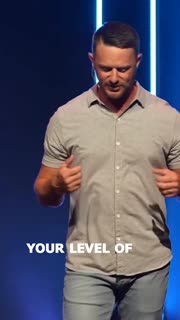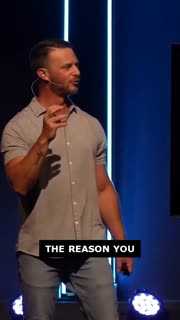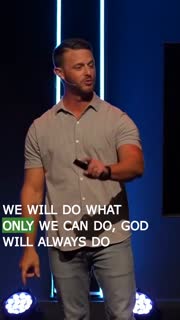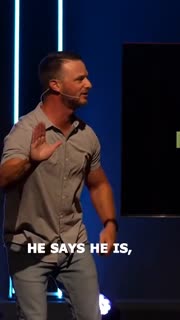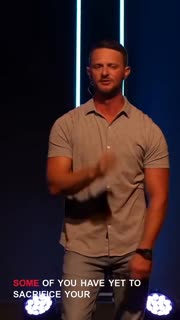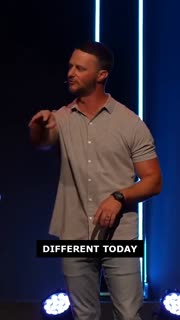Lessons of Leadership and Faith from Kings
Devotional
Sermon Summary
Bible Study Guide
Sermon Clips
### Quotes for Outreach
1. "We believe that your level of worship is indicative to your belief in God, and that if you believe God's that big, man, we shouldn't keep our worship to ourselves. Man, we should be loud about it. We should be proud about it. We are about everything else. We should be about God." [24:51] (13 seconds)
2. "The Bible was not meant for you to cherry pick verses to back up your life. The Bible was meant for us to learn what God has to say to us and base our life on it. The Bible was not written to you. The Bible is actually historical events and spiritual revelations about how we are to live our life. But it was written for you." [31:41] (21 seconds)
3. "God can always do more with you than you can with you. God, hear me parents, this is crazy. God can do more with your kids than you ever could. Life group leaders, if you'll lead the group and let God lead the way, He'll do more with that group than you could." [39:15] (20 seconds)
4. "The reason you feel so beat down and empty is because you're asking something else to do what it can't. You're asking someone else to do what only God can. Your works will never do what God can do. Your submission will always do more than your works can. God is the only God of the universe." [40:44] (21 seconds)
5. "If we will do what only we can do, God will always do what only he can do. We can't out give God with my time, my treasure, or my talent. Everything that I pour out in the name of God, in the kingdom of God, God will do something with and be more powerful with it than I ever could if I had held onto it myself." [52:43] (22 seconds)
### Quotes for Members
1. "When you put authority in corrupt hands, it becomes corrupt authority. And so, now you've got two kingdoms. A nation that used to be united together is now divided with two different rulers that have no interest, in following God. So, you have two people that are having corrupt authority over people." [34:44] (22 seconds)
2. "If God is who he says he is, why are we more afraid than we are faithful? Take a moment and let God heal from the inside. Can I tell you something? Not everything, not every threat has anything that you need to worry about. Let God be God. Let God be God." [54:55] (16 seconds)
3. "Some of you have yet to sacrifice your past. Because it still brings you the attention you want. And God is saying if you want to walk into fullness with me. You have to sacrifice who you were. You have to sacrifice what happened. You got to get over it. You got to get to a place and allow God to bring healing." [01:00:06] (17 seconds)
4. "Following God is not just praying a prayer and living our life the same way. Elisha was found in a field. Doing his own thing. And Elijah goes. Elijah goes. If you want to follow God. If you want to follow me. Get rid of everything that you were. Sacrifice it. And don't leave me. If you leave me. You don't get the blessing of God. It cost Elisha everything. Do you know why? Because it cost God everything. For us." [01:07:45] (33 seconds)
5. "I should look different today than I did six months ago. If my life is submitted to God. I should know more about the word today than I did before I came to Christ. I should pray different. I should worship more passionately now. After. I gave my life to Christ when I was 16 years old. So after. I gave my life to Christ when I was 16 years old." [01:08:14] (18 seconds)
Ask a question about this sermon
1. "We believe that your level of worship is indicative to your belief in God, and that if you believe God's that big, man, we shouldn't keep our worship to ourselves. Man, we should be loud about it. We should be proud about it. We are about everything else. We should be about God." [24:51] (13 seconds)
2. "The Bible was not meant for you to cherry pick verses to back up your life. The Bible was meant for us to learn what God has to say to us and base our life on it. The Bible was not written to you. The Bible is actually historical events and spiritual revelations about how we are to live our life. But it was written for you." [31:41] (21 seconds)
3. "God can always do more with you than you can with you. God, hear me parents, this is crazy. God can do more with your kids than you ever could. Life group leaders, if you'll lead the group and let God lead the way, He'll do more with that group than you could." [39:15] (20 seconds)
4. "The reason you feel so beat down and empty is because you're asking something else to do what it can't. You're asking someone else to do what only God can. Your works will never do what God can do. Your submission will always do more than your works can. God is the only God of the universe." [40:44] (21 seconds)
5. "If we will do what only we can do, God will always do what only he can do. We can't out give God with my time, my treasure, or my talent. Everything that I pour out in the name of God, in the kingdom of God, God will do something with and be more powerful with it than I ever could if I had held onto it myself." [52:43] (22 seconds)
### Quotes for Members
1. "When you put authority in corrupt hands, it becomes corrupt authority. And so, now you've got two kingdoms. A nation that used to be united together is now divided with two different rulers that have no interest, in following God. So, you have two people that are having corrupt authority over people." [34:44] (22 seconds)
2. "If God is who he says he is, why are we more afraid than we are faithful? Take a moment and let God heal from the inside. Can I tell you something? Not everything, not every threat has anything that you need to worry about. Let God be God. Let God be God." [54:55] (16 seconds)
3. "Some of you have yet to sacrifice your past. Because it still brings you the attention you want. And God is saying if you want to walk into fullness with me. You have to sacrifice who you were. You have to sacrifice what happened. You got to get over it. You got to get to a place and allow God to bring healing." [01:00:06] (17 seconds)
4. "Following God is not just praying a prayer and living our life the same way. Elisha was found in a field. Doing his own thing. And Elijah goes. Elijah goes. If you want to follow God. If you want to follow me. Get rid of everything that you were. Sacrifice it. And don't leave me. If you leave me. You don't get the blessing of God. It cost Elisha everything. Do you know why? Because it cost God everything. For us." [01:07:45] (33 seconds)
5. "I should look different today than I did six months ago. If my life is submitted to God. I should know more about the word today than I did before I came to Christ. I should pray different. I should worship more passionately now. After. I gave my life to Christ when I was 16 years old. So after. I gave my life to Christ when I was 16 years old." [01:08:14] (18 seconds)
